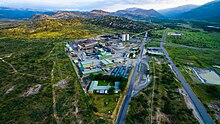

Mining in South Africa was once the main driving force[1] behind the history and development of Africa's most advanced and richest economy.[2] Large-scale and profitable mining started with the discovery of a diamond on the banks of the Orange River in 1867 by Erasmus Jacobs and the subsequent discovery of the Kimberley pipes a few years later. Gold rushes to Pilgrim's Rest and Barberton were precursors to the biggest discovery of all, the Main Reef/Main Reef Leader on Gerhardus Oosthuizen's farm Langlaagte, Portion C, in 1886, which kicked off the Witwatersrand Gold Rush and the subsequent rapid development of the gold field there.
Diamond and gold production are now well down from their peaks, though South Africa is still fifth in worldwide gold production,[3] but remains a cornucopia of mineral riches. It is the world's largest producer[4] of chrome, manganese, platinum, vanadium and vermiculite. It is the second largest producer[4] of ilmenite, palladium, rutile and zirconium. It is also the world's third largest coal exporter.[5] South Africa is also a huge producer of iron ore; in 2012, it overtook India to become the world's third-biggest iron ore supplier to China, the world's largest consumers of iron ore.[6]
Due to a history of corruption and maladministration in the South African mining sector, ANC secretary-general Gwede Mantashe announced at the beginning of 2013 that mining companies misrepresenting their intentions could have their licences revoked.[7]
In 2019, the country was the world's largest producer of platinum;[8] the world's largest producer of chromium;[9] the world's largest producer of manganese;[10] the 2nd largest world producer of titanium;[11] the world's 11th largest producer of gold;[12] the 3rd worldwide producer of vanadium;[13] the 6th largest world producer of iron ore;[14] the 11th largest world producer of cobalt;[15] and the 15th largest world producer of phosphate.[16] It was the world's 12th largest producer of uranium in 2018.[17]
- ^ "South African mining is in crisis". The Economist. Retrieved 21 October 2017.
- ^ "Africa's new Number One". The Economist. Retrieved 4 January 2018.
- ^ "U.S. Geological Survey, Mineral Commodity Summaries, January 2013" (PDF). USGS.gov. Retrieved 4 January 2018.
- ^ a b "USGS Minerals Information: Mineral Commodity Summaries". minerals.USGS.gov. Retrieved 4 January 2018.
- ^ "South Africa's coal future looks bright". Platts.com. Retrieved 4 January 2018.
- ^ SA replaces India as China's No 3 iron-ore supplier, International: Mining Weekly, 2013
- ^ Mining licences can be revoked – Mantashe, International: Mining Weekly, 2013
- ^ "USGS Platinum Production Statistics" (PDF). Archived (PDF) from the original on 9 October 2022. Retrieved 29 April 2021.
- ^ "USGS Chromium Production Statistics" (PDF). Archived (PDF) from the original on 11 May 2021. Retrieved 29 April 2021.
- ^ "USGS Manganese Production Statistics" (PDF). Archived (PDF) from the original on 25 June 2021. Retrieved 29 April 2021.
- ^ "USGS Titanium Production Statistics" (PDF). Archived (PDF) from the original on 9 October 2022. Retrieved 29 April 2021.
- ^ "USGS Gold Production Statistics" (PDF). Archived (PDF) from the original on 9 October 2022. Retrieved 29 April 2021.
- ^ "USGS Vanadinum Production Statistics" (PDF). Archived (PDF) from the original on 13 April 2021. Retrieved 29 April 2021.
- ^ "USGS Iron Ore Production Statistics" (PDF). Archived (PDF) from the original on 9 October 2022. Retrieved 29 April 2021.
- ^ "USGS Cobalt Production Statistics" (PDF). Archived (PDF) from the original on 9 October 2022. Retrieved 29 April 2021.
- ^ "USGS Phosphate Production Statistics" (PDF). Archived (PDF) from the original on 2 May 2021. Retrieved 29 April 2021.
- ^ "World Uranium Mining". Archived from the original on 26 December 2018. Retrieved 29 April 2021.